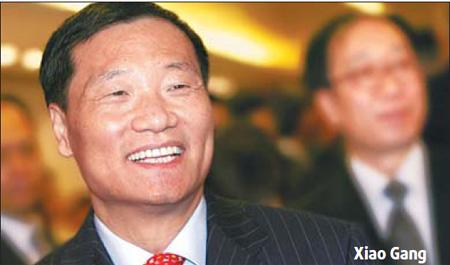
Bank of China (BOC), the nation's third largest lender, will maintain relatively rapid credit growth in 2010, but the amount of new loans to be issued is likely to be lower than that of this year, Xiao Gang, chairman of the bank, said yesterday.
"This is in line with the government call to keep a moderately loose monetary policy next year," Xiao told China Daily on the sidelines of the 2009 China Environmental Protection Industry Development Summit.
The practice of maintaining a relatively fast lending pace was applicable to the entire Chinese banking industry because it was necessary to retain a relatively sizeable liquidity in the market next year, the chairman said.
Bank lending has been critical to reviving the country's slowing economy this year. Chinese banks advanced a record-breaking 9.21 trillion yuan in new loans in the first 11 months of this year, with BOC topping other banks by extending nearly 1.1 trillion yuan in fresh loans during the period.
However, the brisk credit growth has also strained the capital positions of many Chinese banks, spurring a number of mid-sized lenders to raise funds through bond issuance and share sales this year in a bid to shore up their increasingly thin capitalization.
In response to the wide market interest in how major State-owned lenders plan to replenish capital, Xiao said the bank's plan was still under discussion, but noted the lender would look at adjusting its assets structure as an important task next year in order to improve capital efficiency.
"Moderately controlling the lending pace can be another way to shore up finance," the chairman added.
As of the end of the third quarter this year, BOC's capital adequacy ratio stood at 11.63 percent, against the latest 11 percent requirement set by the nation's bank regulator for large State-owned banks.
During the pivotal Central Economic Work Conference that ended last week, the government pledged to stick to the expansive fiscal and eased monetary polices next year, but would put more effort into restructuring the nation's industrial landscape by promoting environmentally friendly and energy-efficient economic growth to the top of its agenda.
In response to the government call, BOC is regarding the environmental protection industry as a promising sector that it could tap into. At yesterday's summit, the bank inked a cooperative memorandum with the Ministry of Environmental Protection, the first of its kind between the ministry and a commercial lender, promising to give more financial support to domestic enterprises engaged in the environmental protection industry.
"The environmental protection industry could be the new growth engine for the economy in the future, and the bank will adhere to its green credit policy and offer more diversified financial services to support the development of domestic environmental protection companies," Xiao said.





